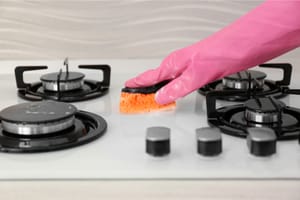Living in an RV trailer during the winter months can be a uniquely rewarding experience, but it comes with its own set of challenges.
With careful preparation and a few key strategies, you can stay warm, and comfortable, and make the most of the season no matter where the road takes you.
Keep reading for practical tips to transform your winter RV living into an enjoyable and stress-free adventure.
1)) Insulate Your RV For Maximum Warmth
Proper insulation is the first step to keeping your RV warm and cozy throughout the winter.
Start by sealing drafty windows and doors with weather-stripping or thermal curtains to minimize heat loss.
Use foam board insulation or RV-specific skirting around the base of your trailer to block cold air from seeping in underneath.
Don’t forget to lay down insulated rugs or mats on the floor to combat chilly surfaces inside.
By reinforcing your RV’s insulation, you’ll create a more energy-efficient space that retains warmth and keeps you comfortable no matter how low the temperatures drop.
2)) Invest In A Reliable Space Heater
A reliable space heater can make all the difference when it comes to staying warm in your RV during winter.
Look for heaters specifically designed for use in small spaces and RVs, such as ceramic or infrared heaters, which are energy-efficient and safe.
Consider models with built-in safety features, like tip-over protection and automatic shut-off, to give you peace of mind while heating your space.
Position your space heater in an area where it can evenly distribute warmth, but always be mindful of keeping it away from flammable materials.
With the right heater, you’ll enjoy a consistently warm and inviting interior even during the coldest nights.
3)) Use Skirting To Reduce Heat Loss
Skirting your RV is an effective way to minimize heat loss and protect your living space from frigid temperatures.
By enclosing the area underneath your trailer, skirting acts as a barrier to prevent cold air from circulating below, which can otherwise chill the interior and freeze plumbing lines.
You can use materials like foam board, vinyl skirting, or even insulated panels, depending on your budget and needs.
Ensure the skirting fits snugly and securely to avoid gaps that could compromise its effectiveness.
By reducing heat loss with proper skirting, you'll ensure your RV stays warmer and more efficient throughout the winter months.
4)) Install Heated Water Hoses
Frozen water lines can be a significant challenge during the winter, but installing heated water hoses can help you maintain a reliable water supply.
These hoses are designed with built-in heating elements that prevent water from freezing, even in sub-zero temperatures.
When selecting a heated water hose, ensure it is compatible with your RV and meets safety standards for cold-weather use.
Remember to connect the hose to a properly insulated water inlet for maximum efficiency.
With heated water hoses in place, you'll eliminate the hassle of frozen lines and enjoy uninterrupted access to running water all season long.
5)) Prevent Frozen Pipes With Proper Maintenance
Frozen pipes can cause significant damage to your RV and disrupt your winter living, so proactive maintenance is key.
Start by wrapping exposed pipes with heat tape or pipe insulation to shield them from the cold.
Keep your RV's internal temperature above freezing, especially at night, to reduce the risk of freezing.
Draining your water system when not in use and keeping your water tank partially filled can also help prevent issues.
Regularly check your plumbing system for leaks or weak points, as these are more vulnerable in cold conditions.
By taking these steps, you’ll protect your pipes and ensure your RV remains fully functional in cold weather.
6)) Use Rugs And Thermal Curtains For Added Insulation
Adding rugs and thermal curtains to your RV is a simple yet effective way to enhance insulation and maintain warmth during winter.
Rugs not only provide a cozy surface for your feet but also act as an extra barrier to block cold air from rising through the floors.
Thermal curtains, on the other hand, help retain heat by reducing drafts and insulating your windows, which are often a major source of heat loss.
Opt for thick, high-quality materials designed specifically for energy efficiency to maximize their effectiveness.
By incorporating these insulating elements, you’ll create a more comfortable and energy-efficient living space, making winter RV life much more enjoyable.
7)) Optimize Your RV's Ventilation System
Properly optimizing your RV's ventilation system is essential for maintaining a healthy and comfortable environment throughout the winter.
Good ventilation prevents excess moisture from building up inside, which can lead to condensation, mold, and unpleasant odors.
Start by inspecting your vents and ensuring they are clean and functioning effectively.
Use vent covers or fans designed for cold-weather use to allow airflow while minimizing heat loss.
Consider installing a dehumidifier to manage humidity levels and further reduce the risk of condensation.
By keeping your RV’s ventilation system in top condition, you’ll enjoy a fresher interior and eliminate potential issues caused by trapped moisture.
8)) Stay Stocked With Winter-Proof Supplies
Keeping your RV stocked with winter-proof supplies is crucial for a smooth and comfortable experience during colder months.
Essential items such as extra blankets, space heaters, and a backup supply of propane can ensure you stay warm even in challenging conditions.
Carry de-icing tools, like ice scrapers and salt, to manage frozen surfaces around your RV.
Don’t overlook having a well-equipped emergency kit with flashlights, batteries, and non-perishable food in case of unexpected situations.
By staying fully stocked with these winter-proof essentials, you’ll be prepared to handle any cold-weather challenges with ease and confidence.
9)) Monitor And Maintain Your Propane Levels
Monitoring and maintaining your propane levels is critical to ensuring your RV stays warm and functional during the winter.
Regularly check your propane tank levels to avoid running out at inconvenient times, especially during freezing weather.
Investing in a propane tank gauge can make it easier to keep track of usage and refill schedules.
Be sure to seal and protect your tank fittings to prevent leaks, as the cold can sometimes cause connections to weaken.
Having a backup propane tank on hand can provide peace of mind in case of emergencies.
By taking these measures, you’ll ensure a steady supply of propane to keep your RV warm and powered throughout winter.
10)) Plan For Safe And Efficient Winter Travel
Planning for safe and efficient winter travel is essential to ensure a smooth and enjoyable RV adventure during the colder months.
Begin by checking the weather forecast and road conditions regularly to anticipate any challenges along your route.
Equip your RV with snow chains or winter tires to improve traction on icy or snowy roads.
Keep your fuel tank full to prevent freezing and carry essentials like de-icing windshield fluid, antifreeze, and a snow shovel.
It's also important to map out rest stops and emergency service locations ahead of time, ensuring help is accessible if needed.
By prioritizing preparation and safety measures, you’ll enjoy peace of mind and a hassle-free winter travel experience.
Conclusion
Preparing your RV for winter is all about being proactive and focused on comfort, safety, and efficiency.
By taking steps such as insulating your space, optimizing your ventilation system, and stocking up on essential supplies, you can face cold weather with confidence.
Careful planning and diligent maintenance ensure that both your RV and your travel experience remain enjoyable, no matter how harsh the conditions may get.
With these strategies in place, you’ll be ready to create memorable adventures while staying warm, safe, and prepared throughout the winter months.
Download Our Free E-book!







